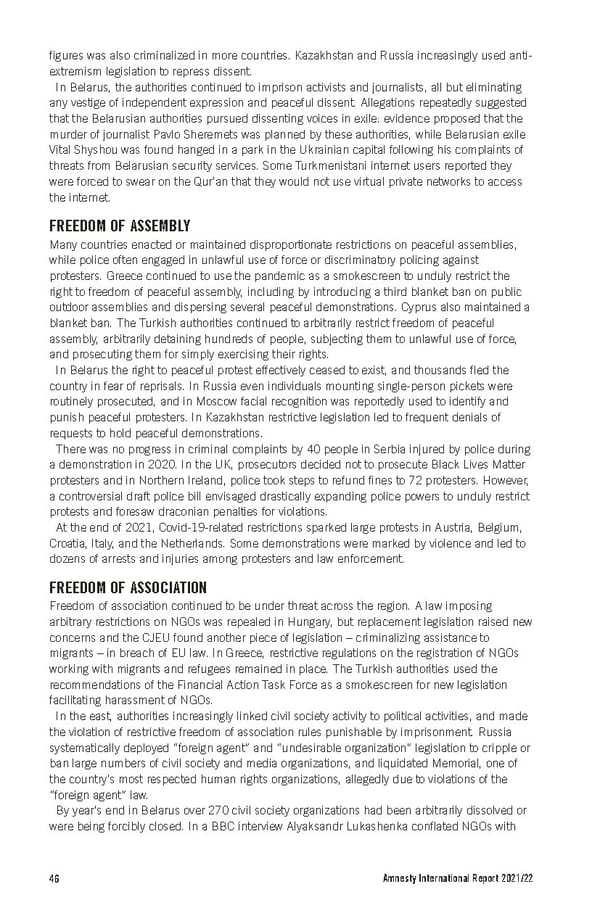figures was also criminalized in more countries. Kazakhstan and Russia increasingly used anti- extremism legislation to repress dissent. In Belarus, the authorities continued to imprison activists and journalists, all but eliminating any vestige of independent expression and peaceful dissent. Allegations repeatedly suggested that the Belarusian authorities pursued dissenting voices in exile: evidence proposed that the murder of journalist Pavlo Sheremets was planned by these authorities, while Belarusian exile Vital Shyshou was found hanged in a park in the Ukrainian capital following his complaints of threats from Belarusian security services. Some Turkmenistani internet users reported they were forced to swear on the Qur’an that they would not use virtual private networks to access the internet. FREEDOM OF ASSEMBLY Many countries enacted or maintained disproportionate restrictions on peaceful assemblies, while police often engaged in unlawful use of force or discriminatory policing against protesters. Greece continued to use the pandemic as a smokescreen to unduly restrict the right to freedom of peaceful assembly, including by introducing a third blanket ban on public outdoor assemblies and dispersing several peaceful demonstrations. Cyprus also maintained a blanket ban. The Turkish authorities continued to arbitrarily restrict freedom of peaceful assembly, arbitrarily detaining hundreds of people, subjecting them to unlawful use of force, and prosecuting them for simply exercising their rights. In Belarus the right to peaceful protest effectively ceased to exist, and thousands fled the country in fear of reprisals. In Russia even individuals mounting single-person pickets were routinely prosecuted, and in Moscow facial recognition was reportedly used to identify and punish peaceful protesters. In Kazakhstan restrictive legislation led to frequent denials of requests to hold peaceful demonstrations. There was no progress in criminal complaints by 40 people in Serbia injured by police during a demonstration in 2020. In the UK, prosecutors decided not to prosecute Black Lives Matter protesters and in Northern Ireland, police took steps to refund fines to 72 protesters. However, a controversial draft police bill envisaged drastically expanding police powers to unduly restrict protests and foresaw draconian penalties for violations. At the end of 2021, Covid-19-related restrictions sparked large protests in Austria, Belgium, Croatia, Italy, and the Netherlands. Some demonstrations were marked by violence and led to dozens of arrests and injuries among protesters and law enforcement. FREEDOM OF ASSOCIATION Freedom of association continued to be under threat across the region. A law imposing arbitrary restrictions on NGOs was repealed in Hungary, but replacement legislation raised new concerns and the CJEU found another piece of legislation – criminalizing assistance to migrants – in breach of EU law. In Greece, restrictive regulations on the registration of NGOs working with migrants and refugees remained in place. The Turkish authorities used the recommendations of the Financial Action Task Force as a smokescreen for new legislation facilitating harassment of NGOs. In the east, authorities increasingly linked civil society activity to political activities, and made the violation of restrictive freedom of association rules punishable by imprisonment. Russia systematically deployed “foreign agent” and “undesirable organization” legislation to cripple or ban large numbers of civil society and media organizations, and liquidated Memorial, one of the country’s most respected human rights organizations, allegedly due to violations of the “foreign agent” law. By year’s end in Belarus over 270 civil society organizations had been arbitrarily dissolved or were being forcibly closed. In a BBC interview Alyaksandr Lukashenka conflated NGOs with Amnesty International Report 2021/22 46
 Amnesty International Report 2021/22 Page 45 Page 47
Amnesty International Report 2021/22 Page 45 Page 47